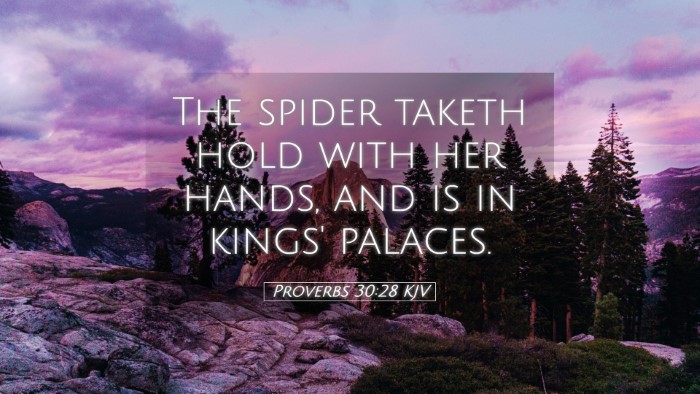Commentary on Proverbs 30:28
Proverbs 30:28 states, "The spider taketh hold with her hands, and is in kings' palaces." This verse highlights the tenacity and adaptability of the spider, drawing a contrast between smallness and significance. Below, we explore various insights from notable public domain commentaries to provide a deeper understanding of this verse.
Insights from Matthew Henry
Matthew Henry reflects on the remarkable ability of the spider, noting its industrious nature despite its diminutive size. He emphasizes that the spider represents those seemingly insignificant individuals who can achieve success even in the most prestigious settings. Henry articulates:
- Resilience: The spider's ability to thrive in kings' palaces illustrates resilience. Those who are humble can rise to prominence through diligence and ingenuity.
- Divine Providence: Henry suggests that God, in His providence, has given even the smallest creatures a place in the grand narrative of creation, reminding believers of their potential impact.
- Symbol of Wisdom: The spider teaches wisdom: it weaves its web carefully, suggesting that one should approach tasks with intention and patience.
Insights from Albert Barnes
Albert Barnes offers a critical analysis of the metaphorical implications of the spider's presence in royal courts. He states that the spider embodies qualities that can be instructive to humans:
- Inconspicuous Influencers: Barnes notes how small creatures can attain an important role, driving home the point that true greatness is not always visible.
- Adaptability: The spider can dwell in various environments, teaching the lesson of adaptability and perseverance in diverse circumstances.
- Connection to Rulers: Being found in kings' palaces, the spider suggests that greatness can often be accompanied by the unremarkable, indicating that even in the highest circles, there are elements of the ordinary.
Insights from Adam Clarke
Adam Clarke provides an extensive commentary on the characteristics of the spider, enhancing the understanding of its role in the ecosystem:
- Nature of the Spider: Clarke notes that the spider is a creature of skill, using its web for survival, which symbolizes the importance of using one's gifts wisely for sustenance.
- Lessons on Industry: The industrious nature of the spider reinforces the notion that effort breeds success; it doesn't rely on the grandiosity of its surroundings but builds its abode wherever possible.
- Spiritual Attributes: Clarke links the spider to spiritual lessons of humility and trust in God, suggesting that wisdom often comes from the bottom up rather than the top down.
Theological Reflections
The imagery of the 'spider' challenges readers, particularly pastors and students of the Word, to recognize the beauty of small and humble beginnings. God's Kingdom often flourishes in unnoticed corners of life:
- The Value of Humility: This verse teaches that those who may lack worldly power can still find themselves in esteemed positions through their actions and character.
- Call to Action: Just as the spider does not shy away from challenges but rather confronts them creatively, believers are called to approach their commissions with determination and resourcefulness.
- Divine Presence in the Ordinary: God’s providence is evident in how small creatures like the spider occupy significant places, reminding us that the divine can use the overlooked and underestimated to fulfill His purposes.
Conclusion
Proverbs 30:28 serves as a profound reminder that both greatness and the mundane can coexist in the same space. The spider’s presence in kings' palaces encourages humility, diligence, and adaptability as key attributes for successful living. From the reflections of Henry, Barnes, and Clarke, it becomes evident that this simple verse encompasses themes of ingenuity, resilience, and the importance of recognizing how the lowly can influence the powerful.


